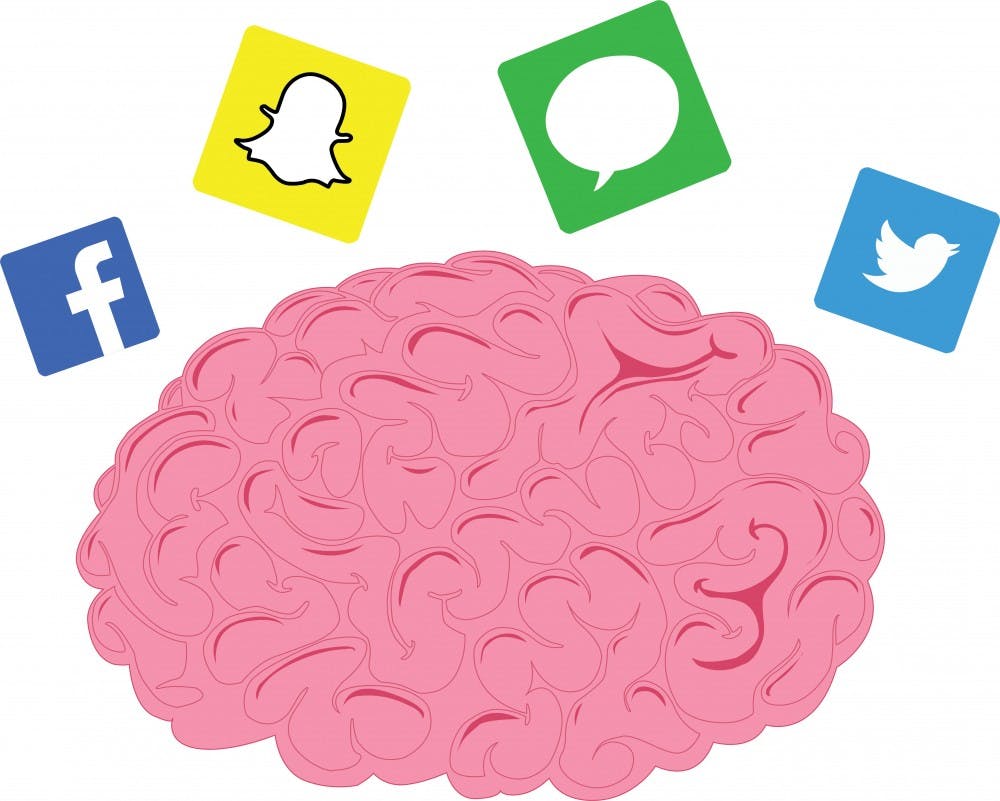Upon walking into an Auburn classroom, it is rare to find a set of eyes that isn’t glued to a screen prior to the beginning of a lecture.
University students check their phones — more specifically, their social media.
Around 3.7 billion people use some kind of social media service. According to a survey conducted by Nielson Ratings, the total time spent on social media by United States citizens has eclipsed 121 billion minutes. That’s nearly 230,000 years that we’ve spent scrolling through sites and apps like Facebook, Instagram and Twitter.
Having spent such a disproportionately large amount of time on the sites, many users would admit this use has affected their mental state in some capacity. Recently, debate has flared up about social media’s ability to affect people from a psychological perspective, influencing the way people see others and the way they see themselves.
Unsurprisingly, most mental health experts would agree that students’ habit of spending so much time tethered to sites that quantify relationships and popularity can have an affect on in-person relationships, school work, stress levels and emotions, among other things.
At the surface, social media provides people with a larger network. However, the broader implications of staying connected online can be slightly more complicated.
Dr. Doug Hankes, director of Student Counseling and Psychological Services at Auburn, highlighted some of the drawbacks of students having an online presence. Hankes believes that one major catch-22 of the whole social media concept is its creation of pseudo-intimacy.
“All of it feels more intimate than it actually is in a face-to-face connection,” Hankes said, describing the sensation of pseudo-intimacy. “I think it feels like the connection is intimate, but a lot of times it’s not so much.”
This feeling can be deceiving and ultimately disappointing for those looking to build meaningful relationships.
Among other drawbacks of being on social media, Hankes mentioned the time wasting aspect of it and the lack of real human connection.
Dr. Peter Chen, professor of psychology and department head, brought to light some of the less direct detrimental effects social media can have on students. He pointed out the envy and social comparison that leads many users to believe those on their feed are consistently happy and having fun.
He added that spending too much time on our phones takes away opportunities to engage with those around us. However, Chen was quick to point out that we shouldn’t be too hasty when it comes to making these generalizations.
Chen believes that social media, when used in certain ways, can help students to engage and therefore feel more integrated on campus. Because most organizations at Auburn advertise opportunities for attending events and getting involved via the Facebook events feature, the site can help students become better members of the community.
Hankes pointed out another major perk associated with social media use. Social media allows users an inflow of infinite amounts of information. By following and keeping up with credible news sources on these platforms, people can ultimately become more informed.
Both Hankes and Chen concluded that there are healthy ways to participate in social media while minimizing its harmful effects. The doctors ultimately encourage students to be mindful of time spent on social media and to use it in moderation.
Hankes likes to unplug from technology every so often and feels the practice can also help others be more in tune with their surroundings.
Chen proposed a similar concept for those less willing to take extended breaks. Setting aside allotted time for social media use each day rather than checking one’s phone constantly can help keep the negative effects at bay, according to Chen.
Ultimately, these platforms can help students achieve goals and broaden their networks when used appropriately.
Chen urges students to learn “how to really use the device as a tool rather than becoming a slave of the device.”
Do you like this story? The Plainsman doesn't accept money from tuition or student fees, and we don't charge a subscription fee. But you can donate to support The Plainsman.





